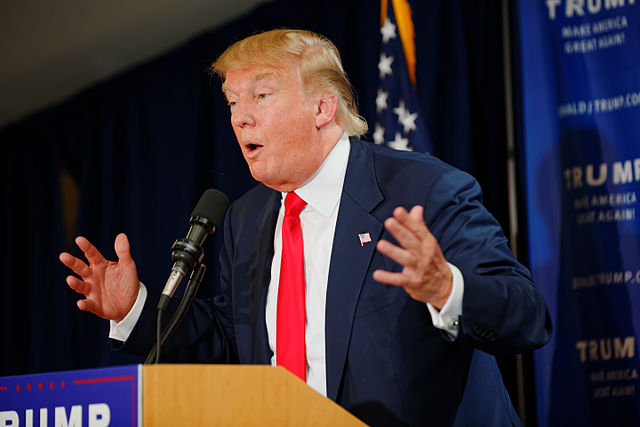by Mark N. Katz
No matter how it starts, once a U.S. military intervention has begun, it has usually been liberals who have questioned it and called for withdrawal while conservatives have backed it and sought to keep it going. Now, though, it is the conservative President Trump who has announced that the U.S. is withdrawing all its ground forces from Syria. His justification for doing so is that their purpose—the defeat of ISIS—has now been achieved, and so U.S. forces are no longer needed there. Numerous observers, though, have noted that while ISIS may have been greatly weakened, it has not been defeated and may even be growing stronger again—something that the U.S. withdrawal will only encourage.
Why, then, has Trump decided to withdraw U.S. troops from Syria? Presumably, he is not doing so due to pressure from his “base” within the U.S. electorate, which would probably support with equal enthusiasm a decision by him (and perhaps only him) either to remain in or withdraw from Syria. And just as Nixon’s withdrawal of U.S. forces from Indochina in early 1973 did not cause Democrats critical of the war to drop their inquiry into the Watergate scandal, Trump’s announced withdrawal from Syria does not seem likely to result in the incoming Democratic House majority going easy on him regarding his 2016 campaign’s possible collusion with Russia and many other issues now.
So if Trump is not withdrawing from Syria for domestic political reasons, perhaps his motives relate to foreign policy concerns. Previously, though, Trump administration officials indicated that U.S. forces would stay in Syria in order to counter the rise of Iranian influence there, and that the U.S. would only leave when Iran did. But now the U.S. is withdrawing from Syria without a corresponding Iranian withdrawal, and Iran and its allies will have a freer hand in Syria as a result. This is something that neither the Trump administration nor its Israeli and Saudi allies want.
Without a clear American domestic political imperative or foreign policy rationale, Trump’s decision to withdraw from Syria is confusing. But considering that Trump’s decision-making often appears to be inscrutable, perhaps focusing on why he made this decision is the wrong question to address. It is more important instead to try to determine what the impact of his decision—whether he intends it or not—might be.
On the negative side—even from the Trump administration’s viewpoint—the U.S. withdrawal, as noted earlier, may allow both ISIS on the one hand and Iran along with Hezbollah and its other Shi’a militia allies on the other to all grow stronger. In addition, the Syrian Kurdish forces with whom U.S. forces have fought with against ISIS will now become more vulnerable to attack from several parties, including Turkey. Further, to the extent that it does embolden Iran and its allies to take actions which Israel sees as threatening, the U.S. withdrawal from Syria may greatly increase the prospects for an Israeli-Iranian conflict.
There may, though, also be a positive side. The U.S. withdrawal from Syria—and consequent reduction in its ability to support Syrian Kurdish forces—may help improve U.S. relations with Turkey, which sees Syrian (as well as other) Kurds as implacable enemies. Similarly, while it has often been noted that the Russian, Iranian, and Turkish governments have differing aims in Syria, the American military presence in Syria has led them all to focus on their differences with the U.S. there and not those with one another. With the U.S. leaving, the differences between them may now come to the fore.
And these differences are considerable. Turkey and Iran support opposing forces in Syria, and may not agree on how to divide Syria into zones of influence. While Iran and Hezbollah are in Syria partly to pursue anti-Israeli aims, Russia has good relations with the Jewish state which it seeks to maintain. Moscow may be hard pressed to prevent the escalation of Israeli-Iranian conflict there, which would only show the limits of its own influence in Syria. Finally, with the U.S. out of Syria, Russia will be the only power from outside the Middle East maintaining forces there. With U.S. forces gone, ISIS and other jihadists may well decide to focus their attention on the Russian forces that remain.
The U.S. withdrawal from Syria, then, may not lead to increased influence for America’s adversaries there, but to considerable difficulties for them instead. But even if American foreign policy benefits from such developments, the Syrian people will not as they will suffer from conflict between opposing forces inside their country. The current U.S. military presence in Syria, though, has not saved them from this.






The Ayatollahs have a cult following, not the Iranian nation. Moreover the people of Iran are under terrible Ayatollah sanctions. The stock market is falling. Oil revenue is falling. So very little funding is available to the IRGC operations in the long run from now on. There will internal divisions.
The people of Iran will not be fooled by this cult that is strangling Iran. The longer they stay in Iraq, Syria and other places to protect their religious centers, the harder it will be for the Ayatollah regime. They have no support.
The people of Iran are recording their every move. Social media is very strong in Iran. The Ayatollahs cannot prevent any of that. The ground is being dug from under them. A non-violent regime change will happen.
So the US has nothing to worry about.
Sometimes, a good idea is just a good idea, no matter how or why it got there. Iran is entirely without any threat to the US; US response is as incoherent and cruel as that to Cuba, for decades post-Missile Crisis – which itself was a genuine ‘difficulty.’ The US has never got over the ‘hostage crisis’ in Iran – the US never forgets, or forgives. A most ‘Christian’ nation.
all the US can do in the middle East (and eastward to Afghanistan, and southward into Africa); – is meddle and worsen already fraught situations. and, incidentally, create who knows how many people reasonably incensed at it, and swearing such vengeance as is to be had.
the Kurds, of course, are once again screwed by the US. Maybe they’ll learn sometime.
Kurdish situation reminds of the African saying “when Elephants fight, the grass gets trampled; when Elephants make love, the grass gets trampled.” After the gassing in 1987-1988 and the US betrayal in 1991-2, the Kurd surely cannot be so naïve as to trust the US to remain and protect them now. Elephants including Turkey, Iran, Iraq and Syria will see to that.
Russia is going to discover that like the US in Iraq 2003, the Pottery Barn motto of “You break it, you fix it/pay for it” resolving the mess in Syria is not going to be a happy ending for anyone. That’s not how the region works. They have the Chechens and long borders with Islamic neighbors.
US mission creep is indeed complicating the Afghan mess. We went in because of the 9/11 events, but still there doing nation building 17 years later? How is that working out?
Everything will get better.
1. ISIS will no longer be able to hide in the U.S. self declare ‘safe zones’ around Al Tanf and western Syria.
2. The Kurds will no longer be deluded into thinking that they have foreign support into creating a new state and may finally seek a rational federalization with the Syrian govt.
3. Iranian and Hezbollah presence will eventually draw down because their presence will be less needed and they have bigger fish to fry.
4. The Syrian cities, such as Raqqa, currently occupied by the U.S. will finally be rebuilt as was Aleppo.
That is IF we actually follow through.
Please read the article written by Paul Craig Roberts published on 12/20 on Paul Craig Roberts.com! You will get a better description of the current situation in Syria!